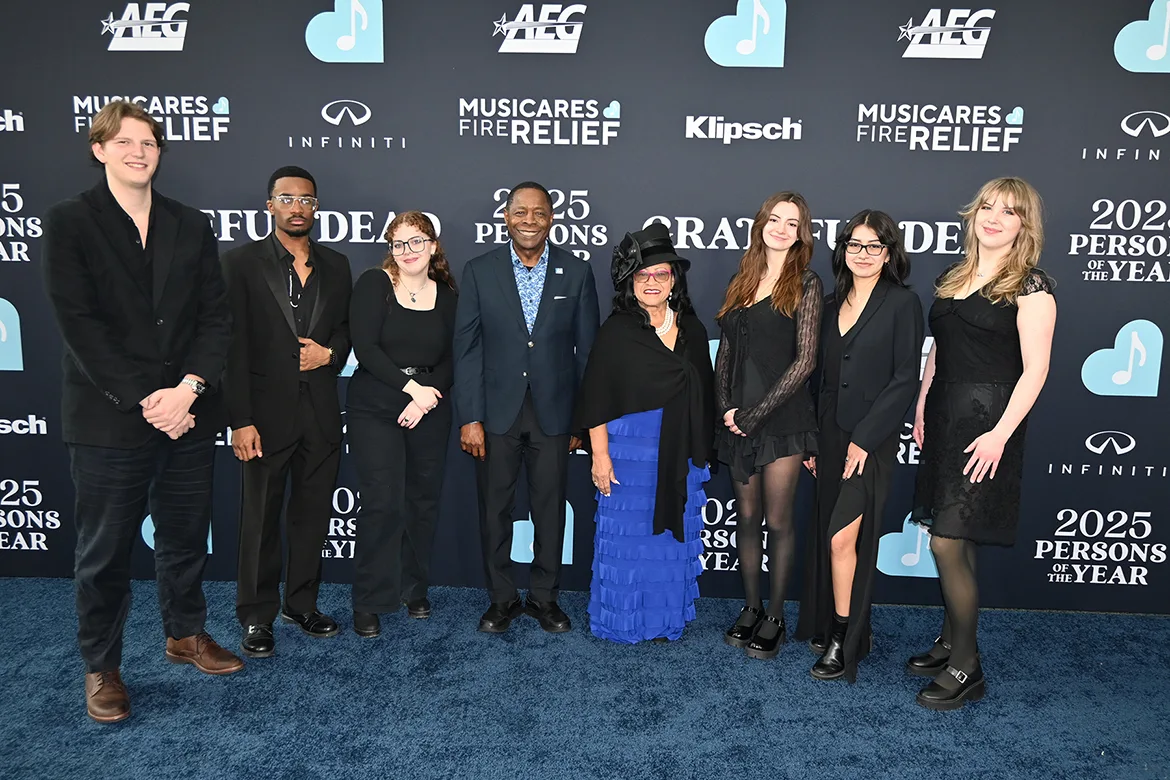
Recording Industry
Music is an economic driver for communities that provides jobs and social cohesion, and all the creative industries.
Recording Industry, Music Business Concentration, B.S.
MTSU's music business degree is offered as a Music Business Concentration of the Bachelor of Science in Recording Industry through the Scott Borchetta College of Media and Entertainment. Students must choose between the Commercial Songwriting Concentration and the Music Business Concentration.
Given its proximity to Music City, MTSU's Department of Recording Industry is a mecca for anyone called to be part of the music scene. If you want to manage or represent artists, market songs to record companies and the media, promote concert tours, or be involved in any aspect of bringing music to appreciative listeners, consider majoring in Music Business in the Department of Recording Industry. Learn directly from and have access to faculty members with experience in all aspects of the music business. Take courses in wonderfully equipped state-of-the-art classrooms. In a program centered around students, real-world experiences and professional contacts are an essential part of learning.
- Considered a "best value" among top-ranked programs
- 100% online Music Business degree available
- Consistently on Billboard's annual list of Top Music Business Schools worldwide
- Comprehensive internship program with industry-leading companies
- Hands-on experiences
- Study-abroad opportunities
The Music Business Concentration offers instruction designed for students who are interested in careers in the music industry, such as record label executive and promotions, artist manager, social media and streaming analytics manager, music publisher, and administrator, playlist curator, venue manager, talent buyer, and entertainment attorney, just to name a few.
Tours
The Recording Industry Department offers faculty-led tours every Friday at 1:00 p.m., during the Fall and Spring terms. During the Summer term, you may schedule tours by appointment. To schedule a tour of the Recording Industry Department, please contact [email protected].
If you live in one of these states: AR GA KY LA MD OK SC VA WV; you may be able to attend MTSU at in-state rates under the Academic Common Market program.
News Briefs

From small-town roots to Missouri Music Hall of Fame: A journey in song for MTSU’s Teachenor
For many musicians, a place in a hall of fame represents the pinnacle of their career — a validation of years of hard work, talent, and dedication. For singer-songwriter and Middle Tennessee State University adjunct professor Jamie Teachenor, his induction into the Missouri Music Hall of Fame is not only a professional milestone but also a deeply personal honor — one rooted in family, heritage, and an unwavering passion for music.[ Read More ]

MTSU on WGNS: Dec. 1 application deadline, Recording Industry brag, RAD self-defense course
Middle Tennessee State University representatives appeared on WGNS Radio recently to share information about an important upcoming application deadline, more accolades for our Recording Industry Department, and an approaching free self-defense course taught by the University Police Department.[ Read More ]
News Briefs

From small-town roots to Missouri Music Hall of Fame: A journey in song for MTSU’s Teachenor
For many musicians, a place in a hall of fame represents the pinnacle of their career — a validation of years of hard work, talent, and dedication. For singer-songwriter and Middle Tennessee State University adjunct professor Jamie Teachenor, his induction into the Missouri Music Hall of Fame is not only a professional milestone but also a deeply personal honor — one rooted in family, heritage, and an unwavering passion for music.[ Read More ]

MTSU on WGNS: Dec. 1 application deadline, Recording Industry brag, RAD self-defense course
Middle Tennessee State University representatives appeared on WGNS Radio recently to share information about an important upcoming application deadline, more accolades for our Recording Industry Department, and an approaching free self-defense course taught by the University Police Department.[ Read More ]
Related Media

Recording Industry, Music Business Concentration, B.S.
Created with input from music industry professionals and the leading industry associations, MTSU's innovative Recording Industry curriculum is a cutting-edge program that helps blaze a tailor-made path for its students into any of the many rewarding careers of Tennessee's robust music industries. Examples include:
- A&R Coordinator or Manager
- Artist Relations and Development Representative
- Artist Manager
- Booking Agent
- Business Manager
- Concert Promoter
- Director of A&R
- Director of Development
- Entertainment Attorney
- Festival Director
- Marketing Coordinator, Manager, or Director
- Merchandiser
- Music Blogger
- Music Business Accountant
- Music Critic
- Music Licensing Representative for Film and Television
- Music Publisher
- Music Researcher
- Music Supervisor
- Personal Assistant to Artist
- Personal Manager to Artist
- Playlist Curator
- Publicist
- Public Relations Manager
- Radio Station Program Director
- Radio Station Promotions Manager
- Radio Station General Manager or Program Director
- Record Label Executive
- Royalties Administrator
- Sponsorship Manager
- Studio Manager
- Talent Representative
- Ticket Sales Director
- Tour Manager
- Venue Manager
- Venue Marketing Director
- Website Content Producer
- Website Manager
- Social Media Manager
Employers of MTSU music business degree alumni include:
- Agency of Performing Arts (APA)
- ASCAP
- Big Loud Bucks Administration
- Big Machine Label Group
- Borman Entertainment
- Broken Bow Records / Stoney Creek Records
- Buddy Lee Attractions, Inc.
- Cal IV Entertainment
- Clear Channel Nashville
- ClearBox Rights, LLC
- Compass Records Group
- Country Music Association
- Country Music Television
- Country Radio Broadcasters
- Country Wired, Inc.
- Creative Artists Agency (CAA)
- CrowdSurf
- Dualtone Music Group
- EMI Christian Music Group
- Gospel Music Association
- Grand Ole Opry
- HoriPro Entertainment Group
- Huskins-Harris Business Mgmt
- iHeartMedia
- Kobalt Music Group
- Live Nation
- Lyon and Phillips, PLLC
- Marathon Music Works
- McGhee Entertainment
- Music City Networks, LLC
- Music City Roots
- Music Services
- National Shows 2
- Neste Event Marketing
- Peer Music
- Premiere Radio Networks
- Provident Music Group
- Rolling Stone
- RPM Management
- Ryman Auditorium
- Select-O-Hits
- Sony Music Publishing
- Sony/ATV Music Publishing
- Ten Ten Music Group, Inc.
- Tennessee Assoc of Broadcasting
- The AristoMedia Group
- The Recording Academy
- Thirty Tigers
- UMG Nashville
- Universal Music Publishing
- Vector Management
- WAMA, Inc. Words and Music
- Warner Music Group
- WarpSpeed, Inc.
- Whizbang, Inc.
- William Morris Endeavor

MTSU’s Career Development Center
MTSU offers a comprehensive Career Development Center that serves students throughout the full student experience and beyond. They collaborate with faculty and staff to equip students with the tools to be marketable to the world of work and continuing education.
Students can schedule an appointment or check online resources and job boards at mtsu.edu/career.
Students can find current internship opportunities by talking to faculty and visiting the University job and internship board called Handshake.
Wondering what you can do with your major? Check out our What Can I Do with A Major In guides.



Degrees
A student majoring in Recording Industry can pursue a Bachelor of Science (B.S.) degree in one of two concentrations: Music Business or Commercial Songwriting. A 100% online music business degree is available.
Also students can major in Audio Production, which leads to a B.S.
For complete curriculum details, click on REQUIREMENTS.
Music Business students must also minor in one of the following: Business Administration, Entrepreneurship, Management, Marketing, or Media and Entertainment (concentrations in Interdisciplinary Media, Media Management, and Photography).
The department also offers undergraduate minors in Entertainment Technology (an interdisciplinary minor) and Recording Industry (for non-majors). Please click here for more information on Recording Industry minors or contact Matt Foglia at 615-904-8424.
Related Links
For graduate students, the Department of Recording Industry offers an MBA with a Music Business Concentration and a Master of Fine Arts (M.F.A.) degree in Recording Arts & Technologies.

CONTACT US















